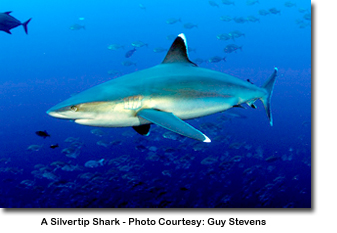
Last year might have marked more than a turnaround for the global economy. It also may prove to have been a watershed for protecting some of the oldest species of fish in our oceans.
Slowly, we're beginning to realize that some shark species could be facing commercial extinction due to unsustainable fishing practices. Last year the United States, the Maldives and several other countries took important steps to help protect dwindling shark populations. But to ensure the long-term future for these magnificent animals, additional work is needed.
There are more than 400 species of sharks swimming in our oceans. Sharks are also some of the oldest large animals in the sea, with an evolutionary history that can be traced to before the age of the dinosaurs. Today they serve as vital apex predators, helping maintain balance in the marine ecosystem by removing excess or diseased fish.
These charismatic marine predators play another useful role: as economic engines for communities that cater to divers and others seeking wildlife-related recreational activities. Worldwide, tourism generated by whale sharks—the largest species of fish on the planet—is estimated to total more than $47.5 million per year. The Bahamas Dive Association has stated that shark-related tourism contributed up to $800 million to its national economy over the last 20 years.
Sharks, however, are also prized for their fins—a key ingredient in an increasingly popular Asian soup. Once considered an exotic delicacy, shark-fin soup consumption has soared over the past decade. Indeed, a UN study found that fin imports to Hong Kong and Taiwan alone rose 214 percent from 1985 to 1999—a situation due in part to the combination of a large, growing population and the explosion of wealth across Asia. This, together with weak to non-existent rules governing shark catches and international trade, has set the stage for massive overfishing.

Up to 73 million sharks are killed each year, primarily to support the global fin trade. Leading marine researchers now warn that 30 percent of the world's shark species are threatened or near threatened with extinction. Some populations, such as scalloped hammerheads and dusky sharks along the eastern U.S. coast, have plummeted by up to 80 percent since the 1970s.
Against this background, 2010 proved an important year for ocean conservation, with both ups and downs. In March, the international community chose commerce over conservation by rejecting protection for an array of marine species at the meeting of the Conference of the Parties to the Convention on International Trade in Endangered Species. This was a hard blow to conservation efforts for a number of threatened animals, including several types of sharks.
Yet while the year had a rocky start, it also saw a number of solid steps forward. Last spring, the Maldives stepped up in the struggle to protect the health of our oceans by creating a sanctuary for sharks in its waters. Roughly an area the size of Portugal, the newly created sanctuary covers 35,000 square miles of the Indian Ocean. This was followed by adoption of protective measures for eight shark species at the November meeting of the International Commission for the Conservation of Atlantic Tunas.
In late 2010, the presidents of Honduras and Palau challenged other world leaders at the United Nations to join them in working to ensure healthy global shark populations by establishing additional sanctuaries and ending the practice of "finning," or the slicing off of a shark's fins only to discard the animal, leaving it to die at sea. The international community must answer this call. This includes establishing domestic sanctuaries where they do not yet exist, regulating international trade and banning all fishing of threatened and endangered shark species lacking management plans.
Finally, as the year ended, Congress passed the Shark Conservation Act. The measure—signed this January by President Obama—will boost efforts to conserve sharks and help stop wasteful finning. But, no matter how bold, the actions of any one country alone will not be enough to save threatened species worldwide.
The clock is ticking for sharks everywhere, yet it's not too late to save these amazing marine predators from extinction.
